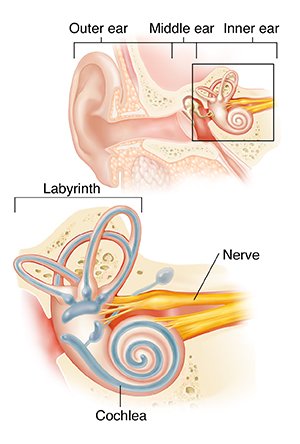Labyrinthitis
Labyrinthitis is the inflammation of part of the inner ear called the labyrinth. It usually affects only one ear. A nerve in the head called the 8th cranial nerve may also be inflamed. Labyrinthitis causes a sense of spinning and hearing loss. In most people, these go away over time.
Understanding the inner ear
The inner ear has a system of fluid-filled tubes and sacs. This system is called the labyrinth. Inside the inner ear, the cochlea senses sound. The vestibular organs sense motion and changes in space. These create your sense of balance. The 8th cranial nerve (vestibulocochlear nerve) sends all of this information from the inner ear to the brain.
When one of the nerves or the labyrinth is infected, it can become inflamed. This can cause it to not work normally. It may cause hearing loss in one ear. The brain now has to make sense of the information that doesn't match between the normal nerve and the infected one. This causes a feeling that the world is spinning around you (vertigo).

What causes labyrinthitis?
A viral infection is the most common cause of the condition. The virus may have spread throughout your body. Or it may only affect the labyrinth and 8th cranial nerve. Usually only one nerve is affected. Viruses that can cause labyrinthitis include:
-
Herpes viruses
-
Influenza
-
Measles
-
Mumps
-
Rubella
-
Polio
-
Hepatitis
-
Epstein-Barr
-
Varicella
Chronic bacterial infections of the middle ear may also spread to the inner ear and cause labyrinthitis. In rare cases, bacterial meningitis or head trauma may cause labyrinthitis. In other cases, the cause of labyrinthitis is not known.
Symptoms of labyrinthitis
Symptoms of labyrinthitis of may include:
-
A feeling of spinning (vertigo)
-
Dizziness
-
Lack of balance when walking
-
Nausea and vomiting
-
Trouble concentrating
-
Back-and-forth eye movements that you can't control (nystagmus)
-
Hearing loss
-
Ringing in the ears
Symptoms may range from mild to severe. Severe symptoms, such as vertigo, can cause problems with standing and walking. Symptoms may come on very quickly and start during routine daily activities. Or you may start to have symptoms when you wake up in the morning. In many people, these symptoms go away over several weeks. Or they can last longer.
Diagnosing labyrinthitis
Your healthcare provider will ask about your past health. You may also have a physical exam. This may include hearing and balance tests. It will also include an exam of your nervous system. There are no specific tests for labyrinthitis so a process of elimination may be necessary to diagnose the condition. Many health conditions can cause dizziness and vertigo. Your healthcare provider will need to make sure you don't have another condition that causes these symptoms, such as stroke.
You may have tests, such as:
-
MRI or CT imaging scans to check for a stroke, head injury, or other neurological conditions
-
Electrocardiogram (ECG), to check for cardiovascular causes
-
Electronystagmography (ENG) or videonystagmography (VNG). These tests record your eye movement to find where the problem is in your vestibular system. These tests can find the cause of a balance disorder.
Treatment for labyrinthitis
Treatment depends on your overall health and symptoms. Treatment for labyrinthitis may include:
-
Corticosteroids to help reduce inflammation of the nerve
-
Antiviral medicines
-
Antibiotics if you have signs of a bacterial infection
-
Medicines to take for a short time that control nausea and dizziness, such as diphenhydramine or lorazepam
If your symptoms go away in a few weeks, you likely won't need other treatment. If you have symptoms that don't go away, you may need to do certain exercises. These are known as vestibular rehabilitation exercises. They are a form of physical therapy. It involves moving your head through a specific set of exercises. These exercises may help your brain learn to adjust to the vestibular imbalance. A physical therapist will teach you the exercises. Then you can do them at home.
Possible complications of labyrinthitis
In most cases, labyrinthitis does not cause any complications. In rare cases, it may permanently damage the 8th cranial nerve. This can cause lasting problems with balance. It can also cause partial or total loss of hearing. You may need to use a hearing aid. Getting treated right away can help reduce your risk for these problems.
When to call your healthcare provider
Call your healthcare provider right away if any of the following occur: